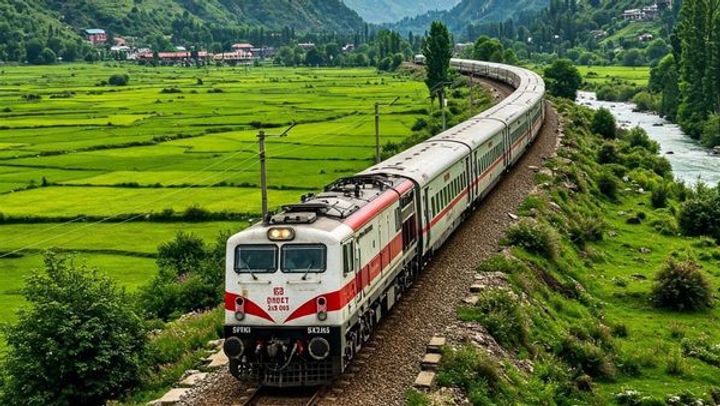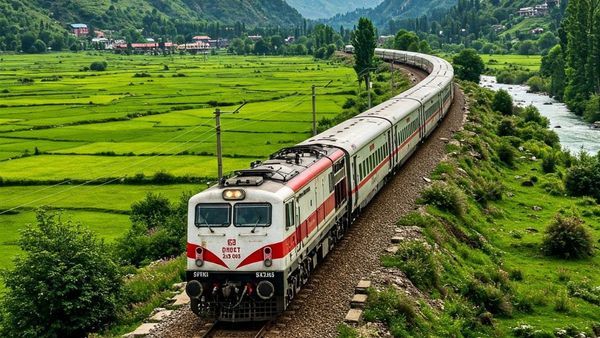
Bengaluru to Rishikesh Direct Train: Complete Guide and Key Details
The introduction of a direct train service connecting a large technical hub Bengaluru in the South India with the spiritual and adventure capital of the North India, Rishikesh, symbolizes significant development in Indian railways. This new train service exists to offer a spontaneous and practical travel option for a wide range of passengers, including pilgrims, adventurous enthusiasts and tourists. Historically, passengers on this route must be a full part of the journey by replacing trains or other means, making it a long and compound journey. This direct service eliminates challenges that offer a continuous railway trip that spreads an important part of the country and connects two cultural and geographically different areas.
The Bengaluru to Rishikesh direct train is more than just a new mode of transport; it is a vital link that addresses several key challenges and benefits a broad demographic.

Fostering Tourism and Pilgrimage: Rishikesh is a great center for religious tourism and an honorable Char Dham is an entrance to pilgrimage. On the other hand, Bengaluru is an important source of domestic tourists. This direct train service makes the people of the South India reach these spiritual and scenic places. By providing a comfortable and reliable alternative for a combination of flights or trains, it solves a logically challenging travel problem.
Economic and social connection: Train travels through many states, including Karnataka, Telangana, Maharashtra, Madhya Pradesh, Uttar Pradesh and training. It combines large cities and towns, which can promote local economies along the route. For students, professional passengers and families, this service provides a cost affect and practical way of traveling between these areas, and promotes more and more social and economic exchange.
Solution of long -ranking travel problems: a single, direct train ride removes multiple orders, transfer and problem with lack of connections. It is especially beneficial for pensioners, families or many goods with children. Single train service facilities and prediction simplifies full travel experience
Recent Updates and Key Changes
The launch of Bangalus for Rishikesh Direct Train is a major development in itself, and inaugurated a new service in mid -2012. This new train, A Special Danger Summer Express, has been an important news article for passengers. June 19, 2025, Indian Railways started the first train service connecting Bangalore (from Yeshwantpur Junction) to Rishikesh. This new service provides a long -long link, with train sum 06597/06598. The first run declared a special service, with a specific program for the first weeks of operations.
This is a good example of Indian Zernben's contradiction to improve the contradiction and to meet the growing demand for practical long distances. The start of this route is also set for other ongoing infrastructure projects, such as Rishikesh -Karanspraing Railway Line, which will be completed by December 2026. At the end of August 2025, Indian Railways is considering reflecting the rules for airlines at large stations. This may mean that passengers may need to pass goods through electronic waiting machines, with specific weight area for each travel class. Although this change is currently in the first role development at some stations, it reflects a trend towards more streamlined and efficient railway trips. Another recent update is a change in advance reservation period (ARP) for ticket booking.
The order window decreases from 120 days to 60 days from the travel date (except for the day of travel). This change is effective from November 1, 2024, which is important to pass
Laws and Policies for Train Travel in India
Train travel in India is governed by a strong set of rules and regulations designed to ensure safety, safety and comfort for all passengers. It is necessary to follow these guidelines for a smooth journey.
Tickets and identification confirmation: Passengers should take a valid ticket and photo identity certificate (eg Aadhaar card, passport or ID) issued by the original government. Travel Ticket Examiner (TTE) has the right to confirm both ticket and passenger identity. Failure to produce a valid ticket or ID can lead to punishment.
Goods rules: While the possible new rules are being assessed, current rules already specify a free remuneration for goods based on class on the journey. For example, AC prefers high weight (usually 70 kg) than sleeping class (usually 40 kg). Overgrowth bag intervention with corridors or other passengers can also be punished.
Behavioral rules: Indian railways have strict passenger behavior rules to ensure a peaceful journey for everyone. This includes a ban on smoking, alcohol consumption and high games, especially after 22:00. These rules are intended to prevent disturbances and ensure a comfortable environment, especially for travelers who want to sleep.
Alarm chain and emergency processes: Abuse of the alarm chain is a serious offense. The series should only be drawn under real emergency conditions, such as a medical emergency or fire. Stretching the chain for no valid reason can lead to significant fines or imprisonment after the Indian Railway Act, 1989.
Tools and Resources for Booking and Travel
Planning a train ride, especially long distance, is made easier with many digital tools and services.
Official and Authorized Booking Platforms
IRCTC website and app: Indian Railway Catering and Tourism Corporation (IRCTC) Official website and mobile application are primary and most reliable resources to book trains. They provide real -time information on train plan, seat accessibility and price information.
Authorized third -party application: Platforms such as Paytm and Makemytrip are authorized partners in IRCTC and provide an alternative way to book tickets. They often provide additional functions, such as PNR status prediction, tracking of live trains and user -friendly interfaces, which can be useful for passengers.
Information and Planning Tools
Train status and PNR status Checkers: Services on platforms such as Redayatri or Indian Railways information allows you to check the Live Status of a train, which is important to be informed of any delay. You can also check the PNR (passenger name) status for your Weightlestad or RAC (Reservation Against Cancellation) ticket to see the possibility of the confirmation.
Seats Accessibility Equipment: Site and apps offer a quick way to check the availability of Seat for Specific Dates and Classes, which is necessary for the plan, especially when the order is competitive.
FAQs
1. Is there a direct train from Bengaluru to Rishikesh? Yes, Indian Railways has introduced a direct train service connecting Yeshwantpur Junction in Bengaluru to Yog Nagari Rishikesh. This is a significant recent development for this route, as previous journeys required a change of trains.
2. How long does the journey take? The travel time for this direct train is approximately 51 to 52 hours. This duration can vary slightly depending on the specific schedule and any operational delays.
3. What is the best way to book a ticket for this train? The most reliable way to book tickets is through the official IRCTC site or the mobile app. You can also use authorized third -party platforms. It is recommended to order well in advance, especially the advance reservation period (ARP) 60 days.
4. What facilities are available on the train? The train usually provides housing of different classes including AC First Class, AC2-Tier, AC 3-Tier, Sleeper Class and general unreserved coaches. Catering services on the ship are also usually available to passengers.
One conclusion acts as the last part of a piece of writing, summarizes big points and strengthens the main argument. It gives a sense of closure and leaves a permanent impression on the reader without introducing new information. A good conclusion combines all the ideas presented effectively and provides some final detail about the discussed topic.
Final thoughts
Railways are still the backbone of Indian connection, and Rishikesh Direct train from Bangalore is a clear reflection of that legacy. For travelers seeking convenience, students who attend education or pilgrims who visit spiritual centers, this route provides a reliable bridge between different landscapes and lifestyle. When modernization efforts are expanded and digital equipment improves passenger experience, such a long range will only become more accessible and meaningful in the coming years.










